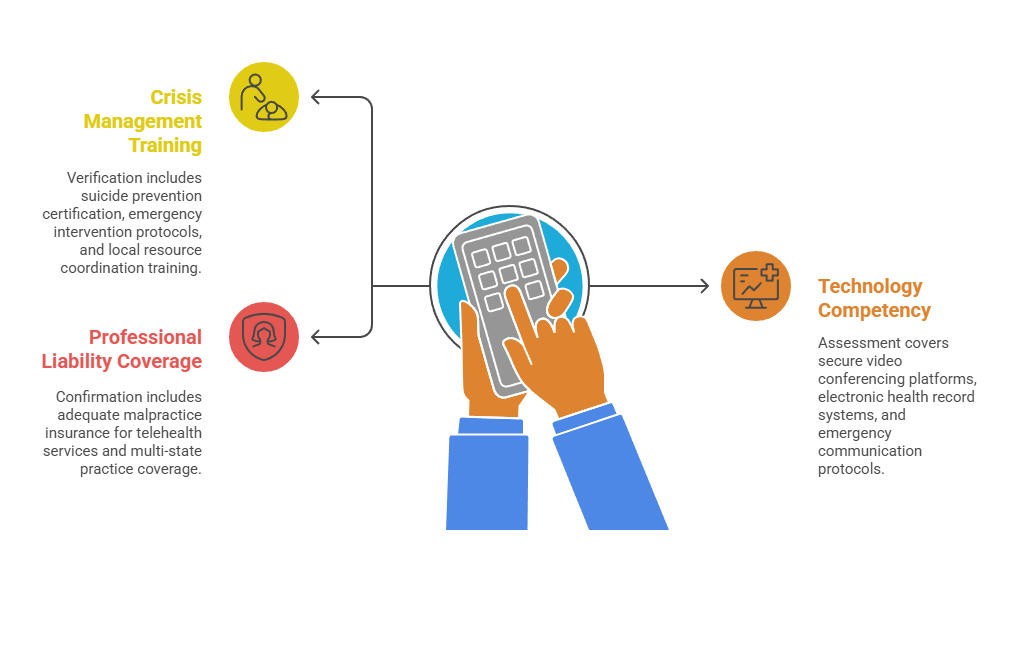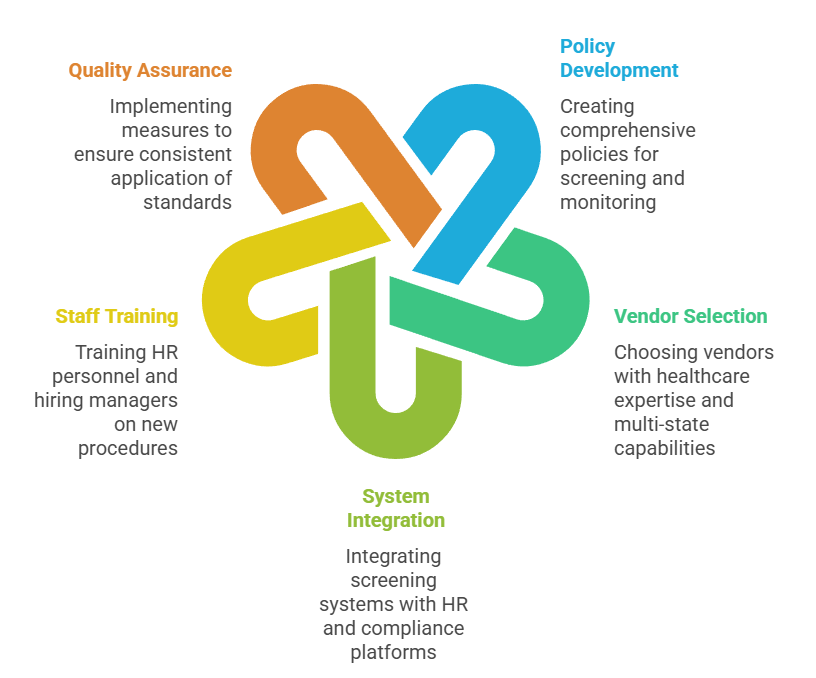Healthcare remote worker background checks require specialized screening protocols beyond standard employment verification, including medical license validation, HIPAA compliance verification, and ongoing monitoring systems. Organizations must balance comprehensive security measures with streamlined onboarding processes to attract qualified telehealth professionals while maintaining regulatory compliance.
Key Takeaways
- Healthcare remote employee screening must include medical license verification, criminal background checks, and specialized healthcare compliance assessments
- HIPAA compliance verification is mandatory for all telehealth worker verification processes, requiring additional documentation and security protocols
- Multi-state licensing verification becomes critical when healthcare workers operate across different jurisdictions remotely
- Ongoing monitoring systems are essential for maintaining compliance throughout the remote employment relationship
- Medical remote employee screening costs typically range 15-30% higher than standard background checks due to specialized requirements
- Healthcare organizations must implement secure data handling procedures during the background check process to protect sensitive medical information
Understanding Healthcare Remote Worker Background Check Requirements
Healthcare remote worker background checks represent a specialized subset of employment screening that combines traditional background verification with industry-specific regulatory requirements. The healthcare industry's transition to remote work has created unique challenges for employers. These employers must ensure their distributed workforce meets the same stringent standards as on-site personnel. Comprehensive screening processes protect both patients and healthcare organizations while enabling the flexibility that modern telehealth services demand.
The regulatory landscape for medical remote employee screening involves multiple federal and state agencies. These include the Department of Health and Human Services, state medical boards, and various professional licensing organizations. Healthcare employers must navigate these complex requirements while maintaining efficient hiring processes. Effective processes don't deter qualified candidates from joining their remote teams.
Remote healthcare positions have grown by 340% since 2020, according to 2024 industry data. This rapid expansion has intensified the need for robust background screening protocols. Healthcare compliance remote work arrangements now require more sophisticated verification systems than ever before.
Federal Regulatory Framework
The federal regulatory framework governing healthcare remote work background checks centers primarily around HIPAA compliance and Medicare/Medicaid provider requirements. Healthcare organizations must ensure that remote workers undergo the same level of scrutiny as traditional employees. Additional considerations for data security and patient privacy protection are essential. The Centers for Medicare & Medicaid Services (CMS) requires specific background check components for any individual with access to beneficiary information, regardless of their physical work location.
Federal requirements also extend to specialized roles within healthcare remote work. These roles include telemedicine practitioners, remote medical coders, and virtual nursing positions. Each category may have distinct screening requirements based on their level of patient interaction and access to protected health information.
State-Level Compliance Variations
State-level compliance variations create additional complexity for telehealth worker verification processes. Each state maintains unique requirements for healthcare background screening. Some states require fingerprint-based background checks while others accept name-based searches. Furthermore, certain states mandate specific timeframes for background check completion before employment can begin.
Interstate practice arrangements multiply these challenges exponentially. Remote healthcare workers serving patients in multiple states must meet each jurisdiction's individual requirements. This creates administrative burden but remains necessary for legal protection and patient safety.
Essential Components of Healthcare Remote Worker Screening

Medical remote employee screening encompasses several critical components that go beyond standard employment background checks. These specialized requirements ensure that healthcare organizations maintain the highest standards of patient care and regulatory compliance in remote work environments. The screening process typically takes 2-4 weeks longer than traditional background checks due to the complexity of healthcare-specific verifications.
Healthcare compliance remote work screening must address both clinical competency and security clearance aspects of remote employment. Organizations need to verify not only an individual's qualifications and background but also their ability to maintain secure, HIPAA-compliant work environments from remote locations. Modern screening protocols now include cybersecurity assessments and home office environment evaluations.
Medical License and Credential Verification
Medical license and credential verification forms the foundation of any healthcare remote worker background check. This process involves confirming active, unrestricted licenses in all states where remote workers will provide services. Additionally, specialty certifications, DEA registrations, and hospital privileges require individual verification. The complexity increases significantly when workers hold multiple licenses or certifications across different specialties.
Primary medical license verification typically takes 5-10 business days through state medical board systems. However, specialty certifications and DEA registrations often require longer processing times. These verifications must be current and show no restrictions or pending disciplinary actions.
| Verification Type | Timeline | Documentation Required |
| Primary Medical License | 5-10 business days | State medical board verification |
| Specialty Certifications | 3-7 business days | Board certification documents |
| DEA Registration | 7-14 business days | DEA verification system check |
| Hospital Privileges | 10-21 business days | Institution verification letters |
License verification represents the cornerstone of telehealth worker verification processes. Healthcare organizations must confirm active, unrestricted licenses in all states where remote workers will provide services.
Criminal Background and Professional History Checks
Criminal background and professional history checks require comprehensive screening at federal, state, and county levels. The healthcare industry maintains strict standards regarding criminal convictions, particularly those involving patient safety, drug-related offenses, or financial crimes. Remote work arrangements don't diminish these requirements and may actually intensify scrutiny due to reduced direct supervision.
Professional history verification includes employment verification, education confirmation, and reference checks. Each previous healthcare position requires detailed review, including reasons for departure and performance evaluations. Educational credentials must be verified through accredited institutions with special attention to medical school and residency programs.
The verification process must be thorough enough to satisfy both internal compliance requirements and external regulatory audits. Healthcare organizations often face increased liability exposure with remote workers. Therefore, comprehensive background screening becomes essential for risk management and patient protection.
HIPAA Compliance and Security Clearance Requirements
HIPAA compliance verification forms a critical component of healthcare remote worker background checks. This process requires specialized assessment of an individual's ability to maintain patient privacy in remote work environments. Healthcare organizations must evaluate both technical security measures and personal accountability factors when screening remote employees. The assessment involves detailed review of home office setups, internet security protocols, and family member access to work spaces.
Telehealth worker verification processes must demonstrate that remote employees can maintain the same level of data protection required in traditional healthcare settings. This includes assessment of secure communication tools, encrypted storage systems, and proper disposal of sensitive documents in home environments. Recent HIPAA enforcement actions have increased scrutiny on remote work security measures significantly.
Technical Security Assessment
Technical security assessments evaluate remote healthcare workers' proficiency with secure technology platforms. Additionally, these assessments confirm commitment to maintaining HIPAA-compliant work environments. The assessment process requires detailed documentation of security measures and regular updates. Home network security verification includes encrypted Wi-Fi networks, firewall protection, and secure internet connections with backup systems.
Device security protocols must demonstrate password protection, automatic screen locks, and authorized user access controls. Data storage compliance requires review of secure file storage systems, cloud service agreements, and local data handling procedures. Organizations typically require remote healthcare workers to complete specialized HIPAA training programs and pass comprehensive security assessments before beginning employment.
Home Office Environment Standards
Home office environment standards have evolved significantly since 2020. Current requirements include dedicated work spaces with controlled access and professional appearance for patient interactions. Privacy measures must ensure that confidential conversations cannot be overheard by family members or neighbors. Physical security measures include locked filing systems and secure disposal methods for physical healthcare documents.
Professional presentation capabilities for patient interactions require adequate lighting, clear audio systems, and neutral backgrounds. Equipment specifications must support high-quality video conferences and patient communications. These standards ensure that remote healthcare delivery maintains the same professional appearance as traditional in-person services.
State-Specific Licensing and Multi-Jurisdictional Considerations
Healthcare remote worker background checks become significantly more complex when employees provide services across multiple states. Each state maintains unique licensing requirements, scope of practice regulations, and background check standards that must be individually satisfied. Medical remote employee screening processes must account for interstate practice agreements, compact licensing arrangements, and state-specific criminal background check requirements.
The Interstate Medical Licensure Compact and similar agreements streamline some aspects of multi-state practice. However, these agreements don't eliminate the need for comprehensive background verification in each jurisdiction. Healthcare organizations must maintain detailed tracking systems to ensure ongoing compliance with varying state requirements. Currently, 32 states participate in interstate medical licensing compacts as of 2025.
Interstate Practice Complications
Interstate practice complications create significant administrative challenges for healthcare organizations. License verification timing can cause 30-60 day delays in the hiring process. Varying criminal check requirements lead to inconsistent screening standards across states. Continuing education differences add compliance complexity for ongoing employee management.
Parallel processing systems help manage these delays by initiating multiple state verifications simultaneously. Comprehensive federal approaches ensure consistent screening standards regardless of state variations. Centralized tracking systems monitor continuing education requirements across all practice jurisdictions effectively.
| Challenge Area | Impact | Solution Approach |
| License Verification Timing | 30-60 day delays | Parallel processing systems |
| Varying Criminal Check Requirements | Inconsistent screening standards | Comprehensive federal approach |
| Continuing Education Differences | Compliance complexity | Centralized tracking systems |
Multi-state practice arrangements require ongoing monitoring to ensure that remote healthcare workers maintain valid licenses. Healthcare organizations benefit from understanding these requirements and structuring their remote workforce accordingly.
Compact State Advantages
Compact state advantages offer streamlined licensing processes for qualified healthcare professionals. However, background check requirements often remain state-specific, requiring healthcare employers to navigate varying standards and timelines. Remote work arrangements may trigger additional scrutiny from state medical boards, particularly when services cross state lines or involve telehealth consultations.
The verification process for compact state licenses still requires comprehensive background screening. Administrative timelines may be reduced through compact agreements, but clinical and security requirements remain unchanged. Healthcare organizations should prioritize hiring from compact states when possible to reduce administrative complexity.
Industry-Specific Background Check Standards
Different healthcare specialties maintain unique background check requirements that impact remote worker screening processes. Medical remote employee screening must account for specialty-specific regulations, professional society standards, and insurance requirements that vary across healthcare disciplines. These specialized requirements often exceed general healthcare background check standards and may include additional verification steps.
Healthcare compliance remote work arrangements require detailed understanding of role-specific risks and corresponding screening protocols. Organizations must balance comprehensive security measures with practical hiring timelines to attract qualified remote healthcare professionals. Specialty-specific screening can add 1-3 weeks to the overall verification process depending on the complexity of requirements.
Mental health professionals working remotely face additional scrutiny regarding patient safety protocols and crisis intervention capabilities. The screening process must evaluate crisis management training, technology competency, and professional liability coverage. These requirements reflect the unique challenges of providing mental health services in remote environments where traditional safety protocols may not apply.

- Crisis Management Training: Verification includes suicide prevention certification, emergency intervention protocols, and local resource coordination training
- Technology Competency: Assessment covers secure video conferencing platforms, electronic health record systems, and emergency communication protocols
- Professional Liability Coverage: Confirmation includes adequate malpractice insurance for telehealth services and multi-state practice coverage
Specialized requirements ensure that remote mental health services maintain the same safety standards as traditional in-person care. These enhanced screening protocols protect both patients and healthcare organizations from potential liability exposure.
Technology and Infrastructure Verification
Technology and infrastructure verification has become a cornerstone of healthcare remote worker background checks. Telehealth worker verification processes must evaluate internet connectivity, hardware specifications, and software competency to ensure reliable service delivery. Organizations need confidence that remote employees can maintain professional standards while working outside traditional healthcare facilities.
The technology assessment component has become increasingly sophisticated as healthcare organizations recognize the impact of technical failures on patient care quality. Remote healthcare workers must demonstrate not only clinical competency but also technical proficiency with specialized healthcare software platforms. Infrastructure failures during patient care can result in serious safety concerns and regulatory violations.
Home office infrastructure verification includes assessment of dedicated work spaces, ergonomic setups, and professional presentation capabilities for patient interactions. Healthcare organizations may require dedicated work spaces with private office areas and controlled access. Additionally, backup internet connectivity through secondary connections or mobile hotspot capabilities ensures service continuity during outages.
Infrastructure Requirements
Infrastructure requirements have evolved significantly since the initial shift to remote healthcare work. Professional lighting and audio equipment specifications ensure clear video conferences and patient communications. Secure document storage systems include locked filing cabinets and secure disposal methods for physical healthcare documents.
Dedicated work space requirements now include privacy controls and professional appearance standards for patient-facing video consultations. Ergonomic setups prevent workplace injuries and maintain productivity during long work sessions. These infrastructure requirements ensure that remote healthcare delivery maintains the same professional standards as traditional in-person services.
Cybersecurity Standards
Cybersecurity standards for remote healthcare workers have become more stringent following increased cyber threats in 2024. Network security protocols must include enterprise-grade firewalls, encrypted connections, and regular security updates. Password management systems require multi-factor authentication and regular password changes for all healthcare-related accounts.
Data backup and recovery procedures ensure that patient information remains accessible during system failures. Incident response plans outline specific steps for handling security breaches or technical failures. These cybersecurity standards protect patient information while ensuring continuity of care in remote work environments.
Ongoing Monitoring and Compliance Maintenance
Healthcare remote worker background checks extend beyond initial hiring to include ongoing monitoring systems that ensure continued compliance throughout the employment relationship. Medical remote employee screening programs must incorporate regular license verification, continuing education tracking, and periodic security assessments. These systems protect healthcare organizations from liability exposure while maintaining high standards of patient care.
Continuous monitoring becomes particularly important for remote healthcare workers who may face less direct supervision than their on-site counterparts. Healthcare compliance remote work programs require sophisticated tracking systems to manage multiple regulatory requirements across different jurisdictions and specialties. Modern systems provide automated alerts for license renewals, continuing education deadlines, and security assessment requirements.
Automated monitoring systems track license expiration alerts, criminal background updates, insurance coverage verification, and exclusion list screening. These systems reduce administrative burden while ensuring comprehensive compliance monitoring throughout the employment relationship. Additionally, they provide documentation for regulatory audits and compliance reviews.
Automated Monitoring Systems
Automated monitoring systems have revolutionized ongoing compliance management for remote healthcare workers. License expiration alerts provide automated notifications for upcoming renewals and continuing education deadlines. Criminal background updates offer ongoing monitoring for new convictions or professional sanctions that may affect employment eligibility.
Insurance coverage verification ensures regular confirmation of professional liability coverage and adequate coverage limits. Exclusion list monitoring provides continuous screening against updated government exclusion databases. These automated features prevent compliance gaps while reducing administrative overhead for healthcare organizations.
Performance Tracking Integration
Performance tracking integration connects compliance monitoring with employee performance management systems. Quality metrics include patient satisfaction scores, clinical outcomes, and technology competency assessments. Regular performance reviews incorporate compliance status alongside clinical performance indicators.
Documentation systems maintain comprehensive records of all monitoring activities and compliance status updates. Audit trails provide detailed history of all verification activities and renewal processes. This integration ensures that compliance monitoring supports overall employee development and organizational quality improvement initiatives.
Cost Considerations and Budget Planning
Healthcare remote worker background checks typically cost 15-30% more than standard employment screening due to specialized verification requirements and extended processing times. Medical remote employee screening expenses include medical license verification fees, specialty certification confirmations, and ongoing monitoring system costs. Organizations must budget for both initial screening expenses and ongoing compliance monitoring costs throughout the employment relationship.
The investment in comprehensive background screening pays dividends through reduced liability exposure, improved patient safety outcomes, and enhanced regulatory compliance. Healthcare organizations often find that thorough initial screening reduces turnover costs and improves long-term employee performance in remote work arrangements. Cost-benefit analysis demonstrates clear return on investment through risk reduction and improved outcomes.
Healthcare organizations should evaluate screening costs against potential liability exposure, regulatory fines, and patient safety risks. Comprehensive background check programs often prove cost-effective when measured against the potential consequences of inadequate screening. Average screening costs range from $500-1,200 per remote healthcare worker depending on specialty and geographic scope.
| Screening Component | Average Cost | Risk Reduction Value |
| Basic Criminal Background | $75-150 | Moderate patient safety protection |
| Medical License Verification | $200-400 | High regulatory compliance assurance |
| Ongoing Monitoring Systems | $50-100/year | Continuous risk management |
Healthcare organizations benefit from economies of scale when screening multiple remote workers simultaneously. Bulk pricing arrangements with screening vendors can reduce per-employee costs significantly.
Best Practices for Implementation
Successful healthcare remote worker background check programs require systematic implementation approaches that balance thoroughness with efficiency. Organizations should develop standardized procedures that address industry-specific requirements while maintaining consistent application across all remote positions. Best practices include clear communication with candidates about screening requirements and expected timelines.
Healthcare compliance remote work programs benefit from dedicated compliance teams that understand both healthcare regulations and remote work challenges. These specialized teams can navigate complex verification requirements while maintaining positive candidate experiences throughout the screening process. Implementation success depends on strong project management and stakeholder engagement throughout the process.
Effective implementation requires phased approaches that allow for process refinement and system optimization. Pilot programs help identify potential challenges before full-scale deployment. Training programs ensure that HR teams understand new requirements and can communicate effectively with candidates and hiring managers.

- Policy Development: Create comprehensive policies addressing all aspects of remote worker screening and ongoing monitoring
- Vendor Selection: Choose screening vendors with healthcare expertise and multi-state capabilities
- System Integration: Integrate screening systems with existing HR and compliance management platforms
- Staff Training: Train HR personnel and hiring managers on new requirements and procedures
- Quality Assurance: Implement quality control measures to ensure consistent application of screening standards
These best practices ensure successful program implementation while maintaining high standards of compliance and candidate experience. Regular program reviews and updates keep pace with evolving regulatory requirements and industry standards.
Implementation Timeline
Implementation timeline planning helps organizations manage the transition to comprehensive remote worker screening programs. Phase 1 includes policy development, vendor selection, and system integration planning over 1-2 months. Phase 2 involves pilot program implementation with limited remote positions during months 3-4.
Phase 3 encompasses full program rollout with ongoing monitoring system activation in months 5-6. Phase 4 includes continuous improvement and regulatory update integration on an ongoing basis. This structured approach allows organizations to refine their processes while ensuring comprehensive compliance from the program's inception.
Conclusion
Healthcare remote worker background checks represent a critical investment in patient safety, regulatory compliance, and organizational risk management. The specialized nature of healthcare services requires comprehensive screening protocols that address clinical competency, security clearance, and ongoing monitoring requirements. Organizations that implement thorough background check programs position themselves for successful remote work integration while maintaining the highest standards of patient care. As the healthcare industry continues embracing remote work arrangements, robust screening processes will remain essential for balancing operational flexibility with regulatory compliance and patient safety requirements.
Frequently Asked Questions
How long do healthcare remote worker background checks typically take to complete?
Healthcare remote worker background checks typically take 3-6 weeks to complete, depending on the complexity of license verifications and multi-state requirements. Medical license verification and specialty certification confirmations often require additional processing time compared to standard employment background checks.
Are background check requirements different for telehealth workers compared to traditional healthcare employees?
Background check requirements for telehealth workers include all traditional healthcare screening components plus additional security clearance assessments for remote work environments. HIPAA compliance verification and technology infrastructure assessments are typically more extensive for remote positions.
What happens if a healthcare remote worker needs to provide services in multiple states?
Multi-state practice requires separate license verification and background checks in each jurisdiction where services will be provided. Healthcare organizations must ensure compliance with individual state requirements, even when interstate compact agreements streamline the licensing process.
How often do healthcare remote workers need to undergo background check updates?
Most healthcare organizations require annual background check updates for remote workers, with ongoing monitoring systems tracking license renewals, continuing education compliance, and criminal background changes throughout the employment relationship.
What are the most common disqualifying factors in healthcare remote worker background checks?
Common disqualifying factors include expired or restricted medical licenses, unresolved criminal convictions involving patient safety or drug-related offenses, exclusion from government healthcare programs, and inability to maintain HIPAA-compliant home office environments.
Do healthcare remote worker background checks cost more than standard employment screening?
Yes, healthcare remote worker background checks typically cost 15-30% more than standard employment screening due to medical license verification, specialty certification confirmations, and ongoing monitoring system requirements specific to healthcare compliance.
Additional Resources
- Department of Health and Human Services Remote Work Guidelines
https://www.hhs.gov/hipaa/for-professionals/security/guidance/cybersecurity/index.html - Interstate Medical Licensure Compact Information
https://www.imlcc.org/ - Centers for Medicare & Medicaid Services Provider Enrollment Resources
https://www.cms.gov/Medicare/Provider-Enrollment-and-Certification - Healthcare Financial Management Association Remote Work Best Practices
https://www.hfma.org/ - American Telemedicine Association Clinical Guidelines
https://www.americantelemed.org/ - National Association of Healthcare Access Management Screening Standards
https://www.naham.org/

GCheck Editorial Team
Meet the GCheck Editorial Team, your trusted source for insightful and up-to-date information in the world of employment background checks. Committed to delivering the latest trends, best practices, and industry insights, our team is dedicated to keeping you informed.
With a passion for ensuring accuracy, compliance, and efficiency in background screening, we are your go-to experts in the field. Stay tuned for our comprehensive articles, guides, and analysis, designed to empower businesses and individuals with the knowledge they need to make informed decisions.
At GCheck, we're here to guide you through the complexities of background checks, every step of the way.





